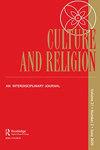Religious/secular discourses and practices of good sex
IF 0.5
0 RELIGION
引用次数: 15
Abstract
Abstract This article focuses on the triangulation of sexuality, religion and secularity in Dutch society by analysing two contemporary case studies. We focus on sexual experiences and practices rather than sexual identities to further understand the constructions of what constitutes ‘good’ sex. The empirical research is situated in the Netherlands, where the binary of religion and sexual regulation versus secularity and sexual freedom has been dominant in both public and political discourse for a long time. Exploring sexual practices and narratives as central to the constitution of both religious and secular selves, we noted these to be fluctuating, inconsistent and subject to discourses. Our first case study discusses sexual experiences of non-heterosexual Protestant women, whereas the second explores the frequently considered ‘neutral’ notions of secularity in sexual education. Applying insights from both religious studies and queer studies, we bring the empirical study of sexuality together with the theoretical debates about the conceptualisation of the secular and the religious in contemporary Western Europe. This comparative approach to sexuality not only undermines the culturally presumed exclusive opposition of the secular and the religious but it also provides new empirical contributions for understanding the interactions between sexual practices and sexual discourses.良好性行为的宗教/世俗话语和实践
摘要本文通过分析两个当代案例,重点探讨荷兰社会中性、宗教和世俗的三角关系。我们关注性体验和性行为,而不是性身份,以进一步理解什么是“好”性的构成。这项实证研究位于荷兰,长期以来,宗教和性规范与世俗和性自由的二元对立一直在公共和政治话语中占据主导地位。在探索性行为和叙事作为宗教和世俗自我构成的核心时,我们注意到这些行为和叙事是波动的、不一致的,并且受制于话语。我们的第一个案例研究讨论了非异性恋新教女性的性经历,而第二个案例研究探讨了性教育中经常被认为是“中立”的世俗观念。运用宗教研究和酷儿研究的见解,我们将性的实证研究与当代西欧世俗和宗教概念化的理论辩论结合起来。这种对性的比较方法不仅破坏了世俗和宗教在文化上的排他性对立,而且为理解性行为和性话语之间的互动提供了新的经验贡献。
本文章由计算机程序翻译,如有差异,请以英文原文为准。
求助全文
约1分钟内获得全文
求助全文

 求助内容:
求助内容: 应助结果提醒方式:
应助结果提醒方式:


